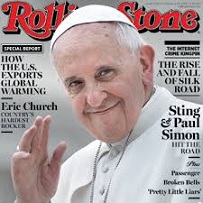
POPE FRANCIS
CHANGES WAITING FULFILLMENT (Vatican II)
Perhaps in the long run the most profoundly influential achievements of Vatican II were not given major importance by the obstructionist bureaucracy and its conservative supporters. The recognition that every member of the human family is born in the state of grace (Link: Grace) and that God’s interaction with the human family is the stuff of history integrating two new components into a working, pastoral, strategy for the CC. (See link: Revelation).
These two backdrop, non-dogmatic beliefs cached in the same box with two elements from experience, evolution and the primacy of conscience, profoundly alter the manner in which the church through its ministry should serve the spiritual needs of the human family. First, the mission of the church becomes universal, directed to all men and women, since all are considered graced through God’ creative love and to be treated as such. In this context the word church needs to be written with a capital C, since encompassing the thousands of belief systems of our created world it becomes an Universal Church.
This is a stark departure from the former working supposition that Christian baptism is required for grace, although Christians will continue to consider baptism as an identifier for their belief systems. Secondly, history becomes the story of God’s relationship with mankind (His-story) in place of a series of dogmatic propositions of the CC such as the divinity of Jesus and the Blessed Trinity. Although these words reflect the foundational beliefs of Christendom, in themselves they are unfathomable mysteries about the UNKNOWN GOD believed through our Christian faith persuasion. Through the Council’s rethinking revelation to include human beings in history the world’s belief systems and not only that of the CC, become subject to the prism of a developmental change within the space-time uneven, ups and downs, zigzags, incompleteness and uncertainties of human progress. Life is messy according to the words of Pope Francis, in which in many, maybe even most instances, the traditional religious notion of sin can be rephrased to mean the more realistic term of brokenness.
Consistent with the spirit that experienced the need for these two significant breakthroughs the Council Fathers guided by the periti (advisory specialists) and the Holy Spirit adopted a new vision of how church should be at the service of today’s world. In anticipation of this new path with unforeseen roles and approaches perhaps even a different organizational model for the CC would be necessary. At least implicitly, this need was anticipated by agreeing on a new ecclesial name, THE PILGRIM PEOPLE OF GOD, where leadership could act as travel agents on our journey toward the mysterious UNKNOWN OTHER without a privileged telephone line to the divine for itinerary information with signposts and stops that only the CC, read the Vatican, would know how to interpret. In a later post we will attempt to relate spiritual approaches with help from Pope Francis’ encounter with the Council to the pilgrimage journey toward our unknown destination.
POPE FRANCIS THE PASTOR OF VATICAN II
It is public knowledge that the reform of the unfortunate but long-lived corruption in the Vatican’s bureaucracy brought Jorge Bergoglio to be the first Pope in recent history to have been elected without a period of apprenticeship in the Vatican’s clerical inbred bureaucratic culture. Since the beginning of his papacy Bergoglio’s pastoral behavior has surprised some, shocked others, and even scandalized many church officials products of the predominant Vatican culture.
Less well known has been the extent to which his views on being church had been derived from the writings and spirit of Vatican II abetted by his Jesuit spirituality, itself a relatively new stage in the millennial history of Christian spirituality. Perhaps most important for embracing the belief that God’s grace is in every human person has been his personal, profound and prolonged experience in the slums of Buenos Aires with poor, afflicted and marginalized inhabitants where he could always detect God’s active presence.
Pope John 23rd had expressed his hope that the Council would open the windows of the Vatican to the Holy Spirit literally closed by Pius 9’s declaration of an infallible absolute supremacy. (See link: Supremacy). Instead of the oft cited windows in the Vatican of Pope John, fifty years later Francis is opening the windows to the Holy Spirit of a visitors’ hostel on the Vatican grounds for guidance as the spiritual leader of the CC. The personal vision lived as an example first for years as an Archbishop and later on an international stage of a radical return to gospel values where Jesus shows his way to the father by seeking out the poor, sick, and marginalized has made Francis something of a superstar and touted as a global moral leader by the media and other religious bodies. This personal life of simplicity and outreach to the lowly and marginalized has surprised not only the powerful conservative remnant still resisting the council but also the church leadership that gave him the mandate to reform.
In post Part three we briefly explore some quotes from Pope Francis where in his own words he unabashedly lays out his notions of God, men and women as they relate to God, and the church, all clearly inspired by Vatican II, his pastoral experience and his debt to the spirituality of St. Ignatius. They serve to contextualize the original directions of his papacy as well as anticipate some of the problems facing a Church to be modeled on Vatican II.